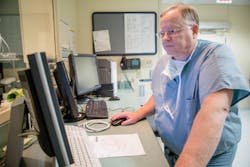St. Louis-based Mercy, the fifth largest Catholic health care system in the nation operating hospitals in four states, was named a 2016 Healthcare Information and Management Systems Society (HIMSS) Enterprise Davies Award recipient this month for achieving improvements in patient care through the use of health information technology.
Since 1994, the HIMSS Nicholas E. Davies Award of Excellence has recognized healthcare organizations that use health information technology to improve patient care while achieving cost savings. As an award recipient, Mercy will share case studies and lessons learned with other health care organizations.
Each year, Mercy serves millions of patients at its 43 acute care and specialty hospitals and through more than 700 physician practices in Arkansas, Kansas, Missouri and Oklahoma. Mercy also has outreach ministries in Louisiana, Mississippi and Texas. Through its supply chain, information technology and virtual care divisions, Mercy also extends its services and expertise to other health care organizations across the U.S.
“Mercy has long been laser-focused on bringing together all aspects of health care – including clinical, operational, technological and analytical functions – so we can collaborate and determine our best way forward for our patients and our organization,” Gil Hoffman, Mercy’s chief information officer, said in a statement. “The Davies Award demonstrates how we’ve been able to blend the best of technology, talent and teamwork to bring better care and better health to our patients.”
Mercy received the award from HIMSS based on four case studies that detailed how the use of health information technology and standardized clinical processes have improved patient care and the bottom line. The case studies included:
Decreasing by nearly three hours the time it took to administer a diuretic to patients with heart failure. A diuretic helps to control patients’ blood pressure by reducing unnecessary salt and water in their bodies through increased urine production. The clinical process helped Mercy achieve mortality rates that are less than half the national average for heart failure patients.
Reducing pneumonia mortality rates to less than half the national average and decreasing the time it took for patients with pneumonia to receive antibiotics.
Using surgical procedure data to help achieve $9.42 million in cost reductions, eliminate or minimize the use of certain surgical products, reduce variation in surgical protocols, establish best practices across surgical departments and ensure quality post-operative results for patients.
Making improvements in clinical documentation to ensure physicians properly capture a clinical diagnosis. Through this work, Mercy has realized $65 million in additional revenue.
“As a Davies Award recipient, Mercy clearly exemplifies how collaborative teamwork, effective planning, use of health information technology and standardized clinical process changes can result in sustainable improvements in patient care,” Jonathan French, senior director of quality and patient safety and Davies program director with HIMSS, said in a prepared statement.
Mercy will be recognized as a HIMSS Davies Award recipient at the 2017 HIMSS Conference & Exhibition from Feb. 19-23 in Orlando, Fla.


